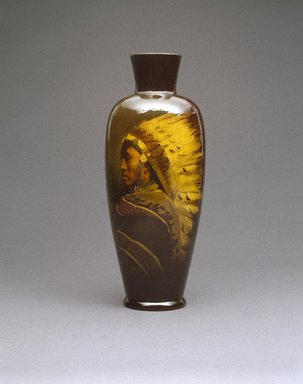Browse

| Accession # | 84.176.4 |
|---|---|
| Maker | Rookwood Pottery Company |
| Decorator | Grace Young |
| Title | Vase, Chief Shavehead |
| Date | ca. 1899 |
| Medium | Glazed earthenware |
| Dimensions | 15 1/2 × 6 × 6 in. (39.4 × 15.2 × 15.2 cm) mount: 15 1/2 × 6 × 6 in. (39.4 × 15.2 × 15.2 cm) |
| Marks | Impressed on bottom: "[stamp consisting of reversed 'RP' monogram surrounded by 13 flames] / 856 / B" Incised by hand on bottom, in script: "- Shavehead - / - Arapahoe - " |
| Inscriptions | no inscriptions |
| Signed | no signature |
| Credit Line | Gift of Mr. and Mrs. Jay Lewis |
| Location | American Identities: Colony to Nation / Inventing American Landscape |
| Description | Vase, slender oviform vase with flared neck decorated with portrait of an Indian brave in profile wearing full-feathered headdress and striped blanket in shades of ochre, green, brown and deep orange, on a dark brown ground. CONDITION: Drilled. Some scratches to glaze, especially lower part of Indian. |
Curatorial Remarks:
During the late nineteenth century, as Indigenous peoples were displaced onto reservations and their land and lifeways denied to them, white settler manufacturers capitalized on their likeness and cultural heritage. In design magazines, living rooms were shown filled with Native baskets, rugs, and ceramics, as well as images of Native people rendered in sculpture, photography, and decorative objects made by white artists.
Grace Young, an artist employed by the woman-owned Rookwood Pottery of Cincinnati, Ohio, was noted for her portraits of Indigenous people. These were often copied from likenesses taken by white photographers, as seen on this vase with the image of an Arapaho individual identified as “Shavehead.” On this amber-hued vase, Young portrayed him as a dignified leader, a design that was particularly attractive to white consumers.